- Home
- Jack Canfield
Chicken Soup for the Soul Christmas Page 7
Chicken Soup for the Soul Christmas Read online
Page 7
Sure, Santa could stand to lose a few pounds—so could I. But somehow the vision of a trim St. Nick in red bicycle shorts just doesn’t cut it.
Elva Stoelers
Reprinted by permission of Off the Mark and Mark Parisi. © 2007 Mark Parisi.
4
THE JOY
OF GIVING
Love is, above all, the gift of oneself.
Jean Anouilh
The Greatest Christmas Gift
The sights, the sounds, the treats, the joys!
Yes, Christmas is for girls and boys.
Yet even someone threescore ten
At Christmas is a child again,
Filled with thrills and wild delight
Each and every Christmas night.
I love the stockings, candles, tree,
Songs, and hospitality.
But most of all, I must confess,
I love God’s Gift of Righteousness,
Wrapped in a manger filled with hay
And placed in my heart with love to stay—
The greatest Gift of Christmas Day!
Bonnie Compton Hanson
Christmas Spirit
The only blind person at Christmastime is he who has not Christmas in his heart.
Helen Keller
The line of disgruntled customers snaked around the counter and disappeared somewhere in the menswear department. There were just two more shopping days before Christmas, and most of the shoppers in line were in panic mode, coiling to strike. One of those customers was my husband, Dale.
Dale is one of those people who shop better under pressure. They are the no-nonsense shoppers who depend on fast service because every minute counts as the countdown before Christmas continues. But the service here was anything but fast.
The problem was the elderly lady at the front of the line, who was twittering happily to the lone salesgirl manning the cash register.
“This sweater is for my granddaughter,” the lady explained. “She’s going to be a teacher, you know. And she’s doing very well. She has a very nice boyfriend who is an architectural technician. He’s just started a job with a good company, but you know, we haven’t seen any sign of a ring yet. Young people seem to wait so long these days. They’ve been going out for quite a while now. Why, I was married with one child and another one on the way when I was her age.”
On and on she rattled as she painstakingly counted out her change, oblivious to the writhing serpent of customers behind her. When she finally zipped her purse shut and picked up her parcel, the clerk motioned to the man next in line.
“Thank you, dearie,” said the lady as she started to move slowly away, checking the contents of her shopping bag. She was almost to the end of the counter when suddenly she turned back. “Oops! Excuse me,” she cried. A collective hiss went down the line. Several fangs were bared. An ominous rattle of keys began in someone’s pocket.
“What’s this for?” she asked, holding up a piece of paper.
“It’s a discount coupon that will give you 15 percent off your next purchase here at the store, from now until the end of January,” replied the weary salesgirl.
“Well, thank you, my dear, but I won’t be needing this,” she beamed. “Here, you can use it right now!” she said, handing it to the man next in line. The man’s eyes widened, and he mumbled a word of thanks as she shuffled to the door.
Then an amazing thing happened. The man stepped up to the counter and used the coupon that the elderly lady had given him. When the clerk handed him another coupon for his next visit to the store, he promptly turned around and gave it to the woman in line behind him. After she had used that coupon toward her purchase and the clerk gave her another one, the woman then passed it back to the shopper behind her. By the time it was Dale’s turn, the salesclerk had a smile on her face, and so did Dale as he turned around to give his coupon to the lady behind him. And so it went, on down the line until there was nothing left of that disgruntled snake, not even a rattle. One small act of kindness had snowballed into a mountain of goodwill.
Dale says it was one of the best gifts he got that Christmas—when he discovered that the Christmas spirit is still alive and well in our world.
Lisa Beringer
Just One Gift
Gratitude is the memory of the heart.
Jean Baptiste Massieur
It was the only Christmas gift I had ever received, and I remember it still. I was six years old, and my mother handed me the brightly wrapped box, explaining it was from her boss at the office where she worked. I nervously held the package in my lap, almost too afraid to open it. Why had a complete stranger given me a present?
My mother was a single parent and often worked several jobs to make ends meet. There usually wasn’t much money left for extras. But that wasn’t the reason why we never owned a Christmas tree or any gifts beneath it. I’d never received a Christmas gift because we are Jewish.
“He couldn’t believe you didn’t have anything to open on Christmas morning,” my mother told me. “He wanted me to give this to you.”
Although she explained to him that we celebrated Hanukkah and I’d received presents then, he insisted that all children should have a gift to open on Christmas. I could tell she felt uncomfortable, and I did, too. Still, I was only six and couldn’t wait to see what was inside.
I carefully unwrapped the box and found a Raggedy Ann doll. Her red yarn hair was soft, and her black button eyes shone. I held her close, and she soon became my favorite toy. I may not have been able to describe the feeling then, but now I know what I felt—it was the Christmas spirit.
Growing up Jewish in a world that celebrates Christmas wasn’t always easy. No colorful lights, decorated trees, or trips to see Santa Claus. Our Hanukkah celebrations were fun—lighting the menorah, spinning the dreidel, and having the benefit of eight nights on which to open gifts. Still, each December we were reminded of our differences.
But to my mother’s boss, our differences didn’t matter. What did matter were the magic of the season and the sharing of joy, and those don’t differentiate between Christian and Jewish children. He just wanted to share his joy with me.
So, even though I don’t celebrate the holiday, I understand what the Christmas spirit is all about. It doesn’t matter what religion you follow, or even what you call it.
It’s the spirit that prompts people to buy a toy for a child who may not receive any others. It’s the spirit that brings Jews into soup kitchens to serve Christmas dinners, or drop coins in a tzedakah box for the needy. It’s about sharing your own joy with others, no matter who they are.
I don’t remember if I wrote the giver a thank-you note, but I hope I did. More than thirty years later, while I don’t know what happened to that doll, I still have the most important gift he gave me—the gift of Christmas spirit.
Ruth Spiro
The Christmas Present
Perhaps the best Yuletide decoration is being wreathed in smiles.
Unknown
“Just four short weeks ’til Christmas!” the radio blared.
I flipped the calendar to December and smiled. In just three weeks we’d be leaving for Texas to enjoy the festivities with our kids. David and I couldn’t wait for the Christmas cookie bake-off with the grandkids, treating our ballerina granddaughter to “The Nutcracker,” and seeing the children’s delight and wonder of Santa coming down the chimney on Christmas Eve. Presents were stacking up, ready for wrapping, and then were stuffed into every nook and cranny of trunk space as our car headed south.
Three weeks is a long time to wait to enjoy the spirit of Christmas, I thought, looking at the piles of ribbon and wrapping paper strewn across the dining-room table.
What can we do here before we leave? The house is much too quiet without the hubbub of children and the excitement that comes with their anticipation, yet it makes no sense to put up a tree— maybe a wreath on the door. Still, we need to do something more, something special just for the two of
us. With that thought, my imagination started to kick in.
The Nebraska winter chill filled the air as David put down his briefcase and slipped through the door that evening. “What’s for dinner, Karen? It smells wonderful.
Are we having company?”
I greeted David with a kiss and slipped my hand in his, gently leading him into the dining room to receive his first Christmas present.
“It’s beautiful, Karen!” he exclaimed. “I love it! But it’s only December first!”
The transformed dining-room table, set with the lovely white damask tablecloth handed down from his grandmother, instantly brought back childhood memories of special dinners in David’s grandparents’ home—just as I knew it would. The sterling silver flatware given to my mother as a wedding gift graced two place settings of our fine white china adorned with deep green salad plates and matching colored-glass stemware. Monogrammed sterling napkin slides given to David’s mother and father by his grandparents added the finishing touch to the napkins. The flickering flames of the candles cast shadows on the silver candelabra and the glimmering silver serving pieces we took pleasure in discovering together on our antique treasure hunts.
“We’re starting a new Christmas tradition,” I said. “With only the two of us and no family close by, I’d like to make the holiday special, just for us. Whether we have a five-course dinner or a simple bowl of soup, we’re going to enjoy it with all the trimmings all month long!”
Embracing me in his arms, David grinned. “You know what a hopeless romantic I am, Karen. This is the best Christmas present you could have ever given me!”
As we sat down to enjoy our intimate rendezvous, strains of Handel’s “Messiah” filled the air, reminding us of the best Christmas present ever given—the gift of God’s unconditional love wrapped in the person of his son, Jesus.
Karen R. Kilby
Six Brown Eggs
The joy of brightening others’ lives,
bearing each other’s burdens, easing other’s
loads, and supplanting empty hearts and
lives with generous gifts, becomes for
us the magic of Christmas.
W. C. Jones
It was the Great Depression. My father and two of his younger brothers were wool growers in southern Utah.
The bottom had dropped out of the wool business, as it also had for cattle and sheep. There was no money. We could neither sell anything nor buy anything.
Papa was almost always at the sheep camp, even at Thanksgiving and Christmas. And since our mother had died when the youngest sister was born, we children were alone. Year after year, we took care of ourselves. We planned our own Thanksgivings and Christmases. But we missed our father. We felt things were not quite fair.
This year, one of his brothers said he would relieve our father at the sheep herd. Our father, our dear papa, would be home! We were overcome with joy. We planned all the things we could do for our marvelous Christmas!
My sisters, Melba, Emma, and little Verle, dragged out the bedraggled Christmas decorations and made the house festive. Jesse cut and stacked armloads of wood on the back porch. He killed a fat hen and left her hanging to drain and freeze. I would dress her for Christmas dinner. I saved the eggs. The hens seldom laid eggs in the cold winter, so I saved every one to make custard pies for Papa.
Papa loved custard pies.
Then we learned that Papa’s brother did not go to the sheep herd. He was home with his family, as always. Papa would not be home. Christmas lost its meaning. There was no money and no way of getting any to buy presents. We had made so many happy plans. For a few moments, our world seemed to fall apart.
At fifteen, I was the oldest. My sisters looked at me with wondering eyes—eyes that said, “Jennie, can’t you do something? Won’t we have any kind of Christmas?”
I went to the pantry to hide my tears. Inside were the six brown eggs; I just looked at them. Then I looked again at these big, brown Barred Rock eggs. Eggs were as scarce as money. Why, those eggs were valuable! They were a dollar, a whole dollar! I laid them carefully on a folded towel in the brass kettle.
My sisters stared at me as I put on my coat and hood, and pulled on my overshoes. They saw my beaming face, and their faces brightened. “Be careful with the fire,” I said at the door, “but keep it going. Santa Claus is at the store, and I’m going to see him.”
I ran like the wind, plowing through snow that came over the top of my overshoes. What if the stores were all closed? “Oh, dear Heavenly Father,” I prayed, “please, please help me.”
The stores were dark. All the storekeepers and the clerks had gone home. But then—a flicker of light in Leo
Munson’s store sparked my hopes. I literally fell through the door as Leo opened it to go home. I held on to the eggs, and, miraculously, none of them were broken.
Leo looked at the eggs, then at me holding the bucket out to him and trying to explain why I was there. I heard myself blurting, “Christmas, Leo, for Jesse and my little sisters. This is all I have. Are they—are they worth a dollar?”
Leo understood, probably far more than I knew. “Don’t say another word, Jennie,” he said. “A dollar! I haven’t been able to buy an egg in town. No one will sell any. My wife wants eggs for Christmas.”
He got sacks and put the things we needed most in them: gloves, socks, stockings. He filled the sacks up even with some store candy and five big, beautiful oranges. “One of those oranges is for you, Jennie,” he said. “Merry Christmas!”
I thanked Leo and thanked him again. Then, with those big, full sacks, I stumbled out the door.
There was no deep snow, no cold wind, no ice, nor sagging, cracking trees. Violets were blooming, and birds were singing, and I walked on apple blossoms. Home to Christmas, bought with six brown eggs—and some help from Leo Munson.
Jennie Spencer Baty
The Treasured Gifts
Come Without Ribbons or Bows
Peace on Earth will come to stay, when we live Christmas every day.
Helen Steiner Rice
“Sometimes the best gifts comewithout ribbons or bows,” Grandma always told us before telling us this favorite family story.
It was 1918, and Grandpa had gone to work paving the roadways and laying railroad tracks in the city while Grandma was working part-time in the canneries. When Papa came home from work, he’d eat a hurried supper and then rush off to night school to get his education. After Grandpa graduated and attained his American citizenship, he went to work full-time on the cannery lines and part-time in a shoe-repair shop. He labored on the night shift so that his days would be free to take care of the children, thereby allowing Grandma to attend school and receive an education.
Grandma anticipated her first day of school in America. The day of her first class was a very important moment in her young life. She knew that she needed an education to become a good citizen of her new country.
On the morning of her first class, Grandma excitedly rushed to dress for school. Though she didn’t have much of a wardrobe, what she did own was clean and well-pressed. As she slipped her feet into her best pair of long black stockings, Grandma’s happy mood dissolved into somber sadness as she discovered her only pair of black stockings riddled with gaping holes.
“Forget about your socks, Mama. You haven’t time to mend them now,” urged Grandpa. “You’ll be late for class. And, anyway, I have a surprise for you!”
A moment later, Grandpa handed Grandma her old high-button shoes. Only now she hardly recognized her old shoes—they gleamed with brand-new leather soles and shiny black laces. She could see her reflection in their brilliant shine. While she had slept that night, Grandpa secretly worked until the wee hours to repair Grandma’s old high-button shoes.
Grandma’s eyes welled with tears of gratitude as she placed a kiss on her husband’s cheek. “I will look like a fine lady in these wonderful shoes, Papa,” she said.
“Hurry now, Mama, hurry. Slip your feet in
side these beautiful shoes, and no one will ever suspect you have holey stockings. It will be our little secret,” Grandpa promised.
Grandma had no time now to mend her tattered stockings. So, she did as her husband suggested and slipped her stockinged feet into her high-button shoes. She quickly laced them up and rushed out the doorway, pausing only a moment for Grandpa to kiss her good-bye and hand her two one-dollar bills for her classroom tuition.
Arriving at school that morning, Grandma felt uneasy in a classroom filled with strangers. Standing at the head of the class was a stern-looking teacher by the name of Miss Peabody. In her hand she held a long, ominous-looking pointer stick, which she used both for pointing and intimidation.
That morning, Miss Peabody passed a large empty bowl around the classroom and instructed each student to drop the tuition fees into the container. Every student complied. One of the more affluent students paid his fee with a bright two-dollar gold piece.
After collecting all the money, the teacher placed the bowl on her desk. Later that afternoon, when Miss Peabody tallied up the tuition money, she discovered the gold coin was missing. Convinced that one of her students took the gold piece, she demanded that everyone in the classroom empty their pockets on her desk. The students promptly obeyed, but no gold coin appeared.
Angry and frustrated, the teacher took her search one step farther and demanded that everyone in the classroom remove his or her shoes. A small gold coin could easily hide in the rim of a high-button shoe.
One by one, the students removed their shoes—everyone, that is, except Grandma. She sat there frozen with embarrassment, hoping and praying the missing coin would turn up before she had to slip off her shoes. But a few minutes later, when the coin failed to appear, Miss Peabody pointed her stick directly at Grandma’s shoes and demanded she remove them.
For what seemed like an eternity, the entire classroom stared down at Grandma’s feet. Grandma, who had been so proud of her elegant shoes, just couldn’t remove them now in front of her peers and expose her holey stockings.

 Chicken Soup for the Nurse's Soul: Second Dose
Chicken Soup for the Nurse's Soul: Second Dose Chicken Soup for the Ocean Lover's Soul
Chicken Soup for the Ocean Lover's Soul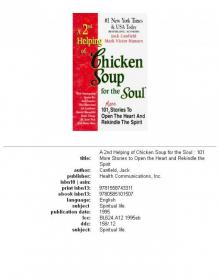 A 2nd Helping of Chicken Soup for the Soul
A 2nd Helping of Chicken Soup for the Soul Chicken Soup for the Nurse's Soul
Chicken Soup for the Nurse's Soul Chicken Soup for the Breast Cancer Survivor's Soul
Chicken Soup for the Breast Cancer Survivor's Soul Chicken Soup for the Pet Lover's Soul
Chicken Soup for the Pet Lover's Soul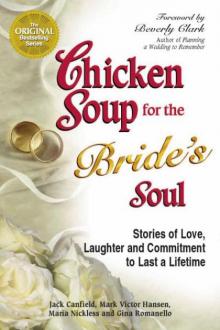 Chicken Soup for the Bride's Soul
Chicken Soup for the Bride's Soul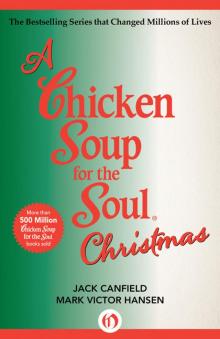 A Chicken Soup for the Soul Christmas
A Chicken Soup for the Soul Christmas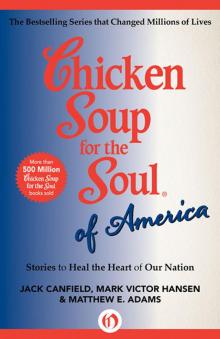 Chicken Soup for the Soul of America
Chicken Soup for the Soul of America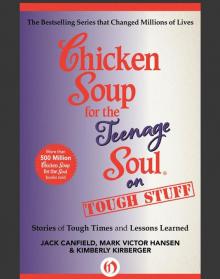 Chicken Soup for the Teenage Soul on Tough Stuff
Chicken Soup for the Teenage Soul on Tough Stuff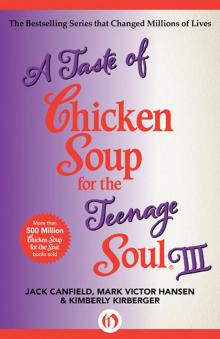 A Taste of Chicken Soup for the Teenage Soul III
A Taste of Chicken Soup for the Teenage Soul III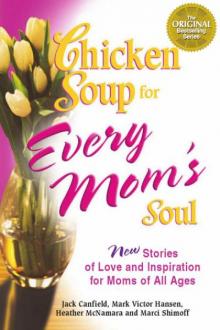 Chicken Soup for Every Mom's Soul
Chicken Soup for Every Mom's Soul Chicken Soup for the Dog Lover's Soul
Chicken Soup for the Dog Lover's Soul A Second Chicken Soup for the Woman's Soul
A Second Chicken Soup for the Woman's Soul Chicken Soup for the Soul the Book of Christmas Virtues
Chicken Soup for the Soul the Book of Christmas Virtues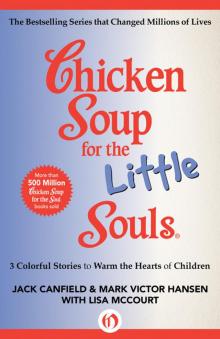 Chicken Soup for the Little Souls: 3 Colorful Stories to Warm the Hearts of Children
Chicken Soup for the Little Souls: 3 Colorful Stories to Warm the Hearts of Children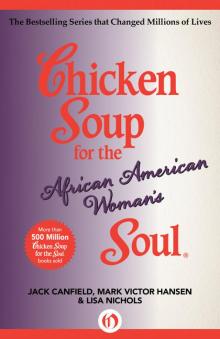 Chicken Soup for the African American Woman's Soul
Chicken Soup for the African American Woman's Soul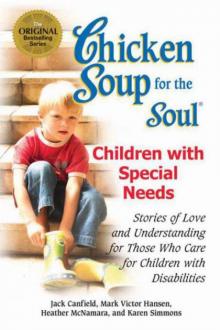 Chicken Soup for the Soul
Chicken Soup for the Soul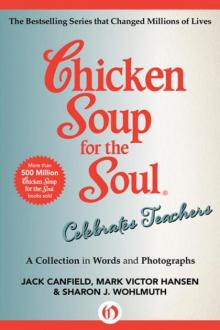 Chicken Soup for the Soul Celebrates Teachers
Chicken Soup for the Soul Celebrates Teachers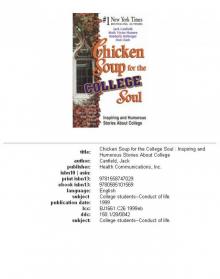 Chicken Soup for the College Soul
Chicken Soup for the College Soul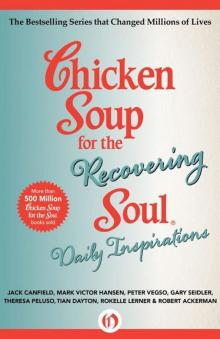 Chicken Soup for the Recovering Soul Daily Inspirations
Chicken Soup for the Recovering Soul Daily Inspirations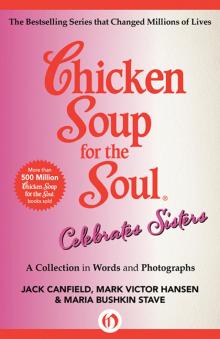 Chicken Soup for the Soul Celebrates Sisters
Chicken Soup for the Soul Celebrates Sisters Chicken Soup for the Dieter's Soul
Chicken Soup for the Dieter's Soul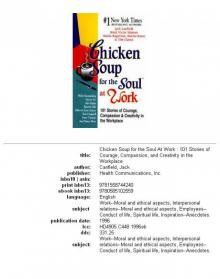 Chicken Soup for the Soul at Work 101 Stories of Courage
Chicken Soup for the Soul at Work 101 Stories of Courage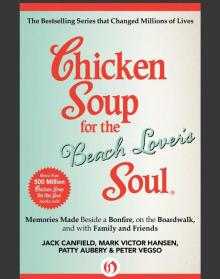 Chicken Soup for the Beach Lover's Soul
Chicken Soup for the Beach Lover's Soul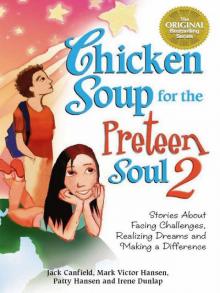 Stories About Facing Challenges, Realizing Dreams and Making a Difference
Stories About Facing Challenges, Realizing Dreams and Making a Difference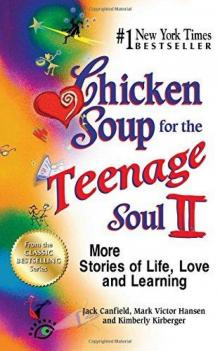 Chicken Soup for the Teenage Soul II
Chicken Soup for the Teenage Soul II Chicken Soup for the Girl's Soul
Chicken Soup for the Girl's Soul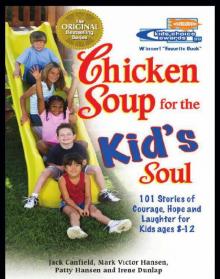 Chicken Soup for the Kid's Soul: 101 Stories of Courage, Hope and Laughter
Chicken Soup for the Kid's Soul: 101 Stories of Courage, Hope and Laughter Chicken Soup for the Woman's Soul
Chicken Soup for the Woman's Soul Chicken Soup for the Cancer Survivor's Soul
Chicken Soup for the Cancer Survivor's Soul Chicken Soup for the Canadian Soul
Chicken Soup for the Canadian Soul Chicken Soup for the Military Wife's Soul
Chicken Soup for the Military Wife's Soul A 4th Course of Chicken Soup for the Soul
A 4th Course of Chicken Soup for the Soul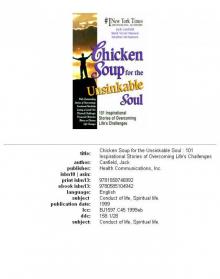 Chicken Soup Unsinkable Soul
Chicken Soup Unsinkable Soul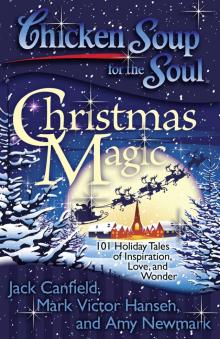 Chicken Soup for the Soul: Christmas Magic
Chicken Soup for the Soul: Christmas Magic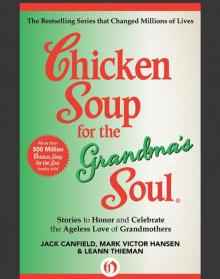 Chicken Soup for the Grandma's Soul
Chicken Soup for the Grandma's Soul Chicken Soup for the Soul: All Your Favorite Original Stories
Chicken Soup for the Soul: All Your Favorite Original Stories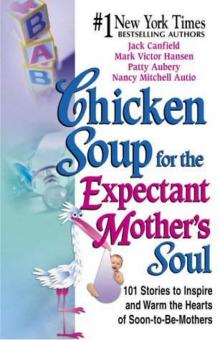 Chicken Soup for the Expectant Mother's Soul
Chicken Soup for the Expectant Mother's Soul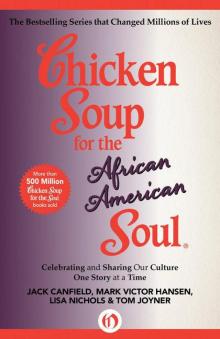 Chicken Soup for the African American Soul
Chicken Soup for the African American Soul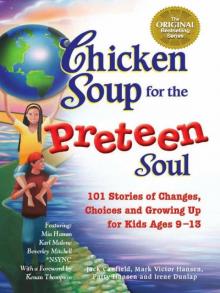 101 Stories of Changes, Choices and Growing Up for Kids Ages 9-13
101 Stories of Changes, Choices and Growing Up for Kids Ages 9-13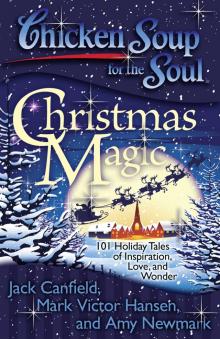 Christmas Magic
Christmas Magic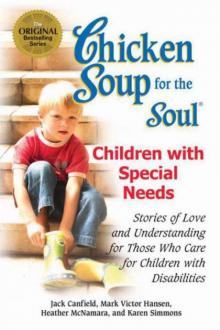 Chicken Soup for the Soul: Children with Special Needs
Chicken Soup for the Soul: Children with Special Needs Chicken Soup for the Soul: Country Music: The Inspirational Stories behind 101 of Your Favorite Country Songs
Chicken Soup for the Soul: Country Music: The Inspirational Stories behind 101 of Your Favorite Country Songs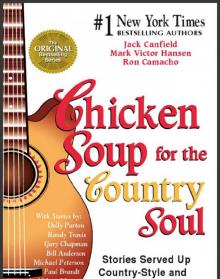 Chicken Soup for the Country Soul
Chicken Soup for the Country Soul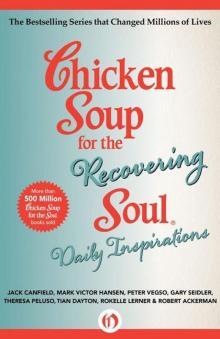 Chicken Soup for the Recovering Soul Daily Inspirations (Chicken Soup for the Soul)
Chicken Soup for the Recovering Soul Daily Inspirations (Chicken Soup for the Soul)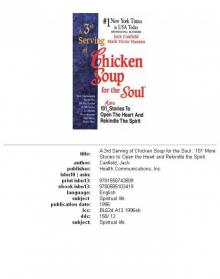 A 3rd Serving of Chicken Soup for the Soul
A 3rd Serving of Chicken Soup for the Soul The Book of Christmas Virtues
The Book of Christmas Virtues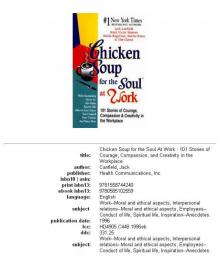 Chicken Soup for the Soul at Work
Chicken Soup for the Soul at Work Chicken Soup for the Soul 20th Anniversary Edition
Chicken Soup for the Soul 20th Anniversary Edition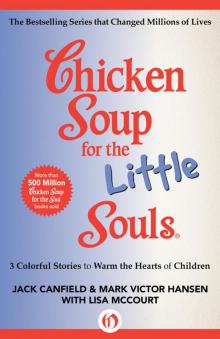 Chicken Soup for the Little Souls
Chicken Soup for the Little Souls Chicken Soup for the Soul: Reader's Choice 20th Anniversary Edition
Chicken Soup for the Soul: Reader's Choice 20th Anniversary Edition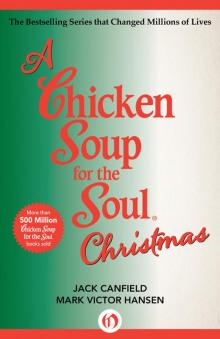 Chicken Soup for the Soul Christmas
Chicken Soup for the Soul Christmas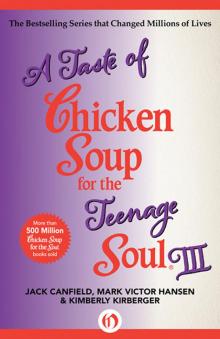 Taste of Chicken Soup for the Teenage Soul III
Taste of Chicken Soup for the Teenage Soul III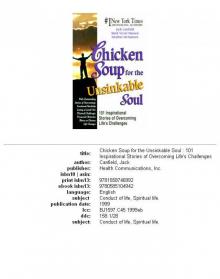 Chicken Soup for the Unsinkable Soul
Chicken Soup for the Unsinkable Soul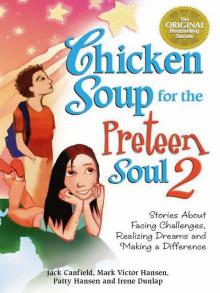 Chicken Soup for the Preteen Soul II
Chicken Soup for the Preteen Soul II